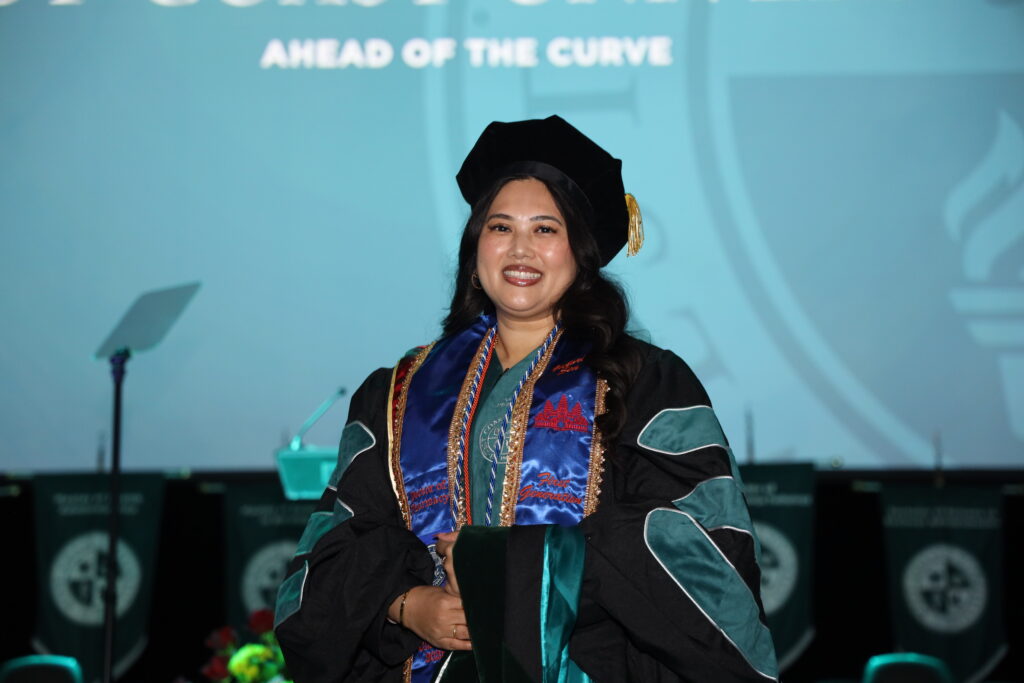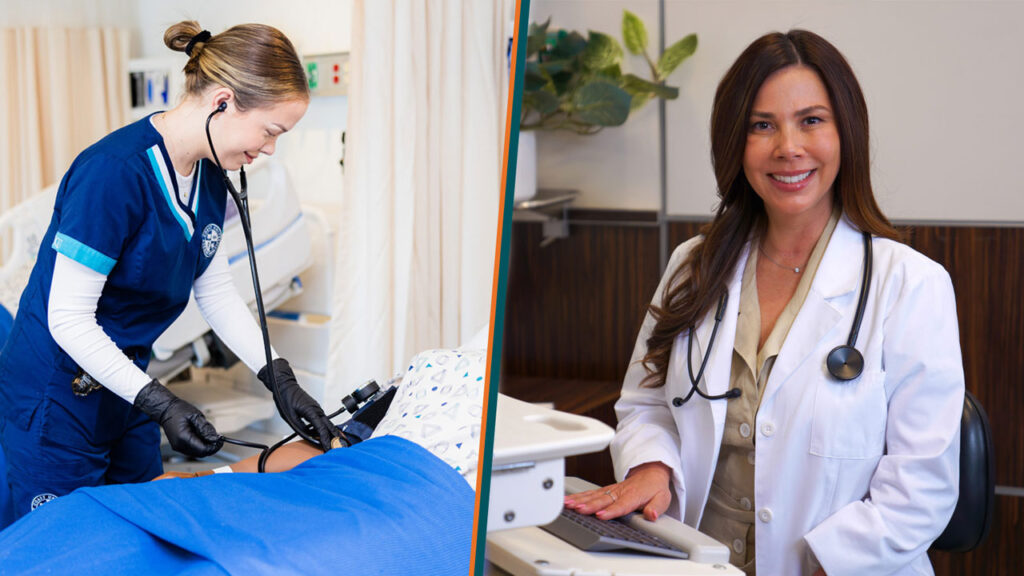The origin story of the physician assistant is richly intertwined with American history. Before it was a recognized profession, military medics who had received “fast track” medical training were helping provide healthcare during World Wars I and II. Around the same time, rural doctors were informally training employees to assist them in treating populations in pastoral areas, far from hospitals.
The same skilled armed-forces medics who were already providing care to soldiers in combat would return home as vets seeking work. Many became among the first physician assistants, as the profession emerged in response to a doctor shortage in the late 1950s. In 1965, the first official PA program began at Duke University, using the “fast track” model.
If you’re thinking of pursuing this respected profession, we encourage you to check out our Master of Physician Assistant program to learn more about what it takes to carry on this tradition of essential medical professionals. As a PA, you’ll provide care in any of an array of medical settings, from hospital operating rooms to rural primary care centers.
Table of Contents
Physician Assistant Job Duties
Physician Assistant Job Duties
What Does a Physician Assistant Do?
A physician assistant works on a team with a supervising physician in a medical setting to provide preventative care, treatments, and procedures. A PA’s specific duties vary by specialization and place of work. For example, a pediatric physician assistant might perform a child’s physical examination or administer vaccines. A surgical physician assistant may assist in the preoperative, performance, and postoperative aspects of a procedure.
While specializations may dictate what treatments you’ll perform within your placement, physician assistant responsibilities will generally include the following (as cited by the U.S. Bureau of Labor Statistics):
- Reviewing and evaluating the patient’s condition and history
- Performing examinations
- Ordering and interpreting diagnostic tests and labs
- Diagnosing conditions, illnesses, and injuries
- Administering treatments, such as immunizations and splints
- Providing patient education and counseling
- Prescribing medication
- Assessing and recording progress
- Researching and staying up to date with treatment options
- Participating in patient and population outreach and education
What Is the Difference Between a Physician Assistant and Nurse Practitioner?
Let’s start with PAs. Physician assistants study and practice medicine broadly in a medical school and will typically work in and for a particular medical field: orthopedics, internal medicine, urology, etc. Physician assistants then work closely with specialists within each field. Studying for a PA degree resembles study toward an MD, with a disease-centric approach.
By contrast, nurse practitioners (and nurses more generally) are educated to work with a specific patient population: children, women, geriatric patients, and more. Within those populations, they may specialize further: neonatal, acute care, family care, etc. A nursing course of study is highly patient-centric.
What Can Physician Assistants Specialize In?
The list of PA specialties is long and diverse. Focuses of specialty can include both general and subspecialty disciplines. There are literally dozens of possible paths to advance your physician assistant career to choose a specialty, but the American Academy of Physician Assistants lists the following common PA specialties:
- Cardiovascular and thoracic surgery
- Emergency medicine
- Family medicine
- Geriatrics
- Hospital medicine
- Internal medicine
- Nephrology
- Obstetrics and gynecology
- Oncology
- Orthopedic surgery
- Pediatrics
- Psychiatry/mental health
And the list goes on. PAs work in all areas of medicine, so you may find yourself teamed with an anaesthesiologist or endocrinologist – or any of a number of other specialists not listed above.
Career Opportunities
Where Do Physician Assistants Work?
Curious what you can do with a MPA degree? According to the U.S. Bureau of Labor Statistics, once you’re licensed to practice as a physician assistant, you may have the opportunity to work in a range of healthcare environments including:
- Physicians’ offices
- Hospitals
- Outpatient care centers
- Educational services
- Government healthcare facilities
Degree Requirements
How Long Does It Take to Become a Physician Assistant?
Completing an MPA degree is typically a two-year program (the WCU’s MPA program is 24 months). You’ll also need an undergraduate degree in order to apply as a graduate student. After that, you will need to pass your certification exam so you can begin working as a PA.
Consider preparation for exams an extension of your school-based study. Field experience is often built into your degree curriculum.
What Subjects Are Covered in a PA Program?
Depending on your school and program, your precise curriculum will vary. We invite you to view the West Coast University MPA curriculum for a detailed look at what your education will include. You can expect your course of study at WCU to touch upon all of the topics below:
- Medical Science
- Clinical Anatomy and Physiology
- Patient Assessment and Counseling
- Pharmacology and Pharmacotherapeutics
- Clinical Diagnostics
- Disease and Society
- Mental Health
- Evidence-Based Medicine
- Art of Care
- Clinical Experience (Women’s/Pediatric/Behavioral/Surgical)
These disciplines and subjects will be taught in the classroom, labs, and through practice experience.
What Is the PANCE Exam?
The Physician Assistant National Certifying Exam (PANCE), administered through the National Commission on the Certification of Physician Assistants (NCCPA), is the credentialing test you must pass after graduation from an MPA degree program, before you are allowed to practice as a physician assistant.
The PANCE Policies, Procedures and Authorization provide for more details on eligibility, testing protocols, and more.
Steps for Taking the PANCE Exam:
- Complete an accredited MPA degree program.
- Register on the NCCPA website.
- Submit your application and pay the $550 exam fee.
- Receive your exam acknowledgement through NCCPA.
- Create a Pearson Vue account and schedule your exam within the 180-day required timeframe.
- Prepare for your exam. (NCCPA offers some study resources.)
- Take and pass your exam, or retake the test (up to six times within six years).
- Receive your Certified Physician Assistant (PA-C) certification.
- Optional: Consider earning a Certificate of Added Qualifications (CAQ) in a PA specialty.
- Renew your certification prior to expiration (varies by state).
WCU Physician Assistant Program: Campus & Hybrid Options
At West Coast University, we provide multiple options for completing your Master of Physician Assistant degree. You can enroll in our Texas MPA degree program, which is completed at our Richardson campus in the Dallas Metro area. Or, you can sign up for our hybrid MPA degree program in California,1 which includes both remote study and some attendance at our Center for Graduate Studies in Los Angeles.
Our campuses have technologically advanced simulation centers that allow students to learn patient care techniques in a safe and realistic practice environment. We also use innovative tools such as virtual dissection tables and augmented reality to improve our students’ learning experiences.
Next Steps
Being a physician assistant is a meaningful career that is indispensable to patient outcomes and a functioning healthcare system. If you’re interested in pursuing an MPA degree and beginning your path as a future physician assistant, tap the Request Info button on this screen or call us at (866) 508-2684 to discuss your education options. We want to help you achieve your educational goals!
1 The ARC-PA has granted Accreditation-Provisional status to the West Coast University Physician Assistant Program sponsored by West Coast University.
Accreditation-Provisional is an accreditation status granted when the plans and resource allocation (if fully implemented as planned) of a proposed program that has not yet enrolled students appear to demonstrate the program’s ability to meet the ARC-PA Standards, or when a program holding Accreditation-Provisional status appears to demonstrate continued progress in complying with the Standards as it prepares for the graduation of the first class (cohort) of students.
Accreditation-Provisional does not ensure any subsequent accreditation status. It is limited to no more than five years from matriculation of the first class. The program’s accreditation history can be viewed on the ARC-PA website at www.arc-pa.org/accreditation-history-west-coast-university/.
To become a certified PA (PA-C), one must pass the Physician Assistant National Certifying Exam (PANCE). In addition, students must obtain state medical board registration/licensure. The licensure requirements will vary from state to state.
A PA may not begin working as a Physician Assistant in most states until he/she has successfully passed the Physician Assistant National Certifying Examination (PANCE) AND has been licensed/registered by the state in which they practice. There may be exceptions for certain state licensures or for federal employment, such as the military and Veterans Administration. Failure to complete all necessary steps may constitute practicing medicine without a medical license. Upon graduation, students are responsible for ensuring they obtain all required licenses and certifications. West Coast University is not responsible for registration or licensing; the student is solely responsible for all such requirements and verifying proper authorizations to practice medicine have been obtained.
WCU provides career guidance and assistance but cannot guarantee employment.
With the COVID-19 endemic, the university is currently offering some on-ground courses in the distance education modality, as needed. As the situation changes, students may be expected to return on-campus to complete their program on-site in the regular learning modality as outlined in the university catalog.
WCU provides career guidance and assistance but cannot guarantee employment. The views and opinions expressed are those of the individuals and do not necessarily reflect the beliefs or position of the school or of any instructor or student.



